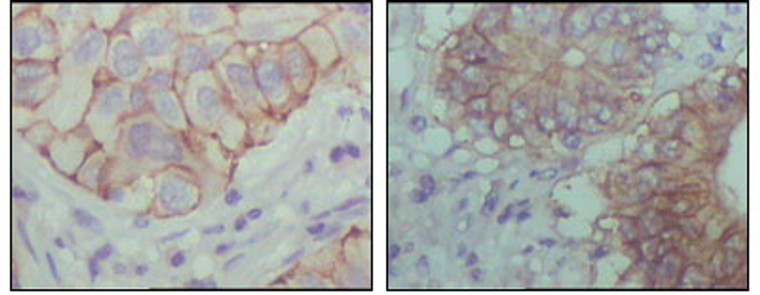| Host: |
Mouse |
| Applications: |
WB/IHC/IF/ELISA |
| Reactivity: |
Human |
| Note: |
STRICTLY FOR FURTHER SCIENTIFIC RESEARCH USE ONLY (RUO). MUST NOT TO BE USED IN DIAGNOSTIC OR THERAPEUTIC APPLICATIONS. |
| Short Description: |
Mouse monoclonal antibody anti-Ephrin type-B receptor 1 (19-133 aa) is suitable for use in Western Blot, Immunohistochemistry, Immunofluorescence and ELISA research applications. |
| Clonality: |
Monoclonal |
| Clone ID: |
5F10A4 |
| Conjugation: |
Unconjugated |
| Isotype: |
IgG1 |
| Formulation: |
Liquid in PBS containing 0.03% Sodium Azide, 0.5% BSA, 50% Glycerol. |
| Purification: |
Affinity purification |
| Dilution Range: |
WB 1:500-1:2000IHC 1:200-1:1000ELISA 1:10000IF 1:50-200 |
| Storage Instruction: |
Store at-20°C for up to 1 year from the date of receipt, and avoid repeat freeze-thaw cycles. |
| Gene Symbol: |
EPHB1 |
| Gene ID: |
2047 |
| Uniprot ID: |
EPHB1_HUMAN |
| Immunogen Region: |
19-133 aa |
| Specificity: |
EphB1 Monoclonal Antibody detects endogenous levels of EphB1 protein. |
| Immunogen: |
Purified recombinant fragment of EphB1 (aa19-133) expressed in E. Coli. |
| Post Translational Modifications | Phosphorylated. Autophosphorylation is stimulated by the ligand EFNB1. Required for interaction with SH2 domain-containing interactors, for activation of the MAPK/ERK and JUN signaling cascades and for ubiquitination by CBL. Ubiquitinated.(EFNB1)ligand-induced poly- and/or multi-ubiquitination by CBL is regulated by SRC and leads to lysosomal degradation. |
| Function | Receptor tyrosine kinase which binds promiscuously transmembrane ephrin-B family ligands residing on adjacent cells, leading to contact-dependent bidirectional signaling into neighboring cells. The signaling pathway downstream of the receptor is referred to as forward signaling while the signaling pathway downstream of the ephrin ligand is referred to as reverse signaling. Cognate/functional ephrin ligands for this receptor include EFNB1, EFNB2 and EFNB3. During nervous system development, regulates retinal axon guidance redirecting ipsilaterally ventrotemporal retinal ganglion cells axons at the optic chiasm midline. This probably requires repulsive interaction with EFNB2. In the adult nervous system together with EFNB3, regulates chemotaxis, proliferation and polarity of the hippocampus neural progenitors. In addition to its role in axon guidance also plays an important redundant role with other ephrin-B receptors in development and maturation of dendritic spines and synapse formation. May also regulate angiogenesis. More generally, may play a role in targeted cell migration and adhesion. Upon activation by EFNB1 and probably other ephrin-B ligands activates the MAPK/ERK and the JNK signaling cascades to regulate cell migration and adhesion respectively. Involved in the maintenance of the pool of satellite cells (muscle stem cells) by promoting their self-renewal and reducing their activation and differentiation. |
| Protein Name | Ephrin Type-B Receptor 1ElkEph Tyrosine Kinase 2Eph-Like Kinase 6Ek6Hek6Neuronally-Expressed Eph-Related Tyrosine KinaseNetTyrosine-Protein Kinase Receptor Eph-2 |
| Database Links | Reactome: R-HSA-2682334Reactome: R-HSA-3928662Reactome: R-HSA-3928664Reactome: R-HSA-3928665 |
| Cellular Localisation | Cell MembraneSingle-Pass Type I Membrane ProteinEarly Endosome MembraneCell ProjectionDendrite |
| Alternative Antibody Names | Anti-Ephrin Type-B Receptor 1 antibodyAnti-Elk antibodyAnti-Eph Tyrosine Kinase 2 antibodyAnti-Eph-Like Kinase 6 antibodyAnti-Ek6 antibodyAnti-Hek6 antibodyAnti-Neuronally-Expressed Eph-Related Tyrosine Kinase antibodyAnti-Net antibodyAnti-Tyrosine-Protein Kinase Receptor Eph-2 antibodyAnti-EPHB1 antibodyAnti-ELK antibodyAnti-EPHT2 antibodyAnti-HEK6 antibodyAnti-NET antibody |
Information sourced from Uniprot.org
12 months for antibodies. 6 months for ELISA Kits. Please see website T&Cs for further guidance







